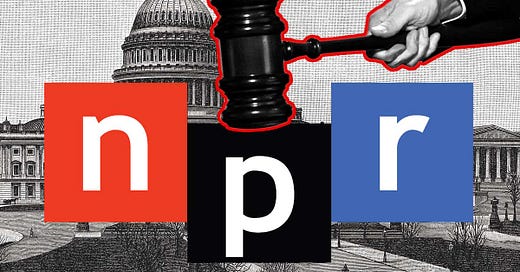
The Free Press

It’s been about 10 months since I wrote an essay for The Free Press in which I lamented, much more in sorrow than in anger, that NPR, my journalistic home for 25 years, had lost the trust of a large segment of the country.
Once curious, open-minded, and rigorous—if liberal leaning—public radio news had devolved into a doctrinaire source of what I called “one story after another about instances of supposed racism, transphobia, signs of the climate apocalypse, Israel doing something bad, and the dire threat of Republican policies.” In 2020 alone, we dismissed the very possibility of a Covid lab leak in China, and our then–managing editor refused even to cover Hunter Biden’s laptop, calling it “not really” a story.
NPR’s tilt reflects a feedback loop between the views of its journalists and the political leanings of its formerly diverse, now overwhelmingly liberal, audience. For privately funded news media, this might make for a perfectly appropriate contribution to America’s diverse media landscape. For taxpayer-assisted NPR, however, such a political trajectory cannot be squared with a claim on dollars from Congress. My critics blamed my critique for putting NPR funding at risk. They were in denial—shooting the messenger.
Now the crisis is at hand. Republicans control Congress and the White House, and they seem serious about what had previously been ritualistic GOP threats to cut public media. Katherine Maher, the NPR CEO who called my Free Press essay “disrespectful, hurtful, and demeaning,” has been called before the House Subcommittee on Delivery on Government Efficiency, possibly as soon as early March. (NPR suspended me without pay for five days, ostensibly for unauthorized freelancing. I resigned from NPR upon being suspended.) Also summoned is Paula Kerger, CEO of PBS.
Their chief interrogator will be none other than Marjorie Taylor Greene, the subcommittee chair and MAGA firebrand who, it is fair to say, ranks just below President Donald Trump on the NPR audience’s least-admired list. Democrats on the panel, meanwhile, will no doubt act as de facto defense lawyers for a public media system that’s congenial to their worldview and integral to their constituents’ lifestyles.
Fireworks seem inevitable. On the off chance that any member of the panel—I’m looking at you, persuadable Republicans and moderate Democrats—wants to generate light rather than heat, here is what I would ask my former boss:
News is everywhere—on cable TV, newspapers, podcasts, legacy networks, commercial radio, Substacks. What does NPR provide that audiences can’t get elsewhere?
Can you provide examples of NPR coverage that criticized or questioned progressive narratives on crime, immigration, youth gender medicine, or climate change?
Ms. Maher, you said, regarding your previous role as the CEO of the Wikimedia Foundation, that “our reverence for the truth might be a distraction that is getting in the way of finding common ground and getting things done.” What exactly did you mean? Do you still believe it? And if so, how is such a view compatible with leadership of a news organization?
The immediate past CEO of NPR, the late John Lansing, declared diversity, equity, and inclusion “the North Star” of the organization. Is it still? If not, why not? And if so, please explain how DEI influences NPR’s hiring, training, and coverage.
In 2021, I found 87 registered Democrats among NPR editorial staff residing in D.C., where the network is headquartered. There were zero Republicans, along with 44 registered with no party. Is NPR doing anything to address this seeming lack of viewpoint diversity, such as hiring journalists from conservative media, recruiting military veterans, or seeking candidates who attended religious colleges and state universities?
Do you have any regrets about how NPR dealt with the Hunter Biden laptop story, the lab leak theory, or most recently, President Joe Biden’s apparent cognitive decline while in the White House?
NPR says it gets 1 percent of its annual operating budget directly from federal funding. A larger portion—reportedly around 10 percent—flows indirectly to NPR through member stations that acquire NPR programming with support from the Corporation for Public Broadcasting. Would you be open to a new financing structure that lets local member stations keep more money?
An oft-stated argument for federal funding is that it supports public radio stations in small towns and rural areas where local news coverage is scarce. How, specifically, do typical Americans living outside major metropolitan areas benefit from NPR as it is currently constituted?
What would happen to NPR if it loses federal funding? Wouldn’t it be more creative and freer, journalistically, if it went private? Wouldn’t you rather never have to testify at another hearing like this?




